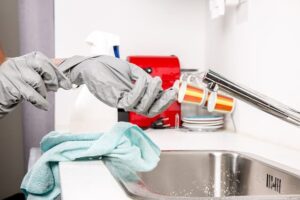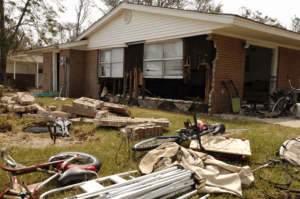As a trusted biohazard cleanup company working here in the Pacific Northwest, we often encounter blood on projects we take on. Whether it’s the result of trauma, suicide, a crime scene, or an unattended death, the presence of blood causes our cleanup technicians to step up their preventative measures even further than our normal protocols. The same is true when used injection syringes (with needles) are present, such as in homeless camps or public spaces where IV drug users congregate to shoot up.
Why do we take special care when blood is present in a cleanup scene?

HIV virus under microscope
Because there are various viruses and other pathogens that can be present in blood, and some of them can survive for extended periods of time. According to the Centers for Disease Control (CDC), the three most common ones are:
- HIV
- Hepatitis B
- Hepatitis C
All three of these illnesses can be fatal. Becoming infected with any of these from contact with blood is usually via a cut in the skin (such as the needle puncture the police officer suffered) or contact with mucous membranes.
The Likelihood of Becoming Infected from These Bloodborne Pathogens
We don’t want to over-exaggerate the risk, because the rate of transmission is low. For example, your risk of contracting HIV from a dirty needle is only 0.3% In a 15-year time span, the CDC was only able to document 57 cases, and of those the majority were health care workers like nurses and lab techs, and they were all related to a cut or puncture. (Note: Some researchers claim the rate is far higher. But even 1 in 300 is too big of a gamble.)
Though on the decline since 1977 (a 95%) drop, due mainly to a new vaccine and massive immunization of health care workers, Hepatitis B still remains a health threat. It can cause severe liver damage and can be fatal. The estimated risk of contracting it via contact with a needle or cut is somewhere between 6-30%.
Hepatitis C causes damage similar to Hep B. There are 4 other Hepatitis viruses – A, D, E, and G. All can be transmitted via contaminated blood, and it is believed that Hepatitis E can also be spread by drinking water contaminated with feces from an infected individual. Some are also sexually transmitted. Hep D, E, and G are rare in the U.S., but occasional cases have been documented.
Of course, this is not an exhaustive list of dangers that may accompany blood spills, but it does include the most common ones. The wisest course of action when encountering used needles is to avoid any contact whatsoever; report them to the appropriate authorities. (If you live in the Seattle area, the direction is to call 911.)
And if you have property that has been contaminated by spilled blood, we recommend you contact a biohazard cleanup company such as ours, with trained technicians and specialized equipment to safely decontaminate the area and dispose appropriately of anything contaminated with the blood. We are also experienced in property restoration, should tear-out of building materials, carpeting, and other furnishings be required.

 If you own a property here in the Pacific Northwest, chances are that sooner or later you are going to need the help of a biohazard cleanup company. Now, that term might be a little restrictive, because usually companies like ours offer a lot more than
If you own a property here in the Pacific Northwest, chances are that sooner or later you are going to need the help of a biohazard cleanup company. Now, that term might be a little restrictive, because usually companies like ours offer a lot more than  As
As  It seems as the weeks go on,
It seems as the weeks go on, 

